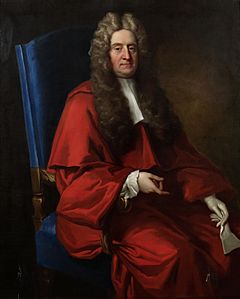Joseph Jekyll facts for kids
Quick facts for kids
Sir
Joseph Jekyll
|
|
|---|---|

Portrait by Jonathan Richardson
|
|
| Chief Justice of Cheshire | |
| In office 1697–1717 |
|
| Preceded by | John Coombe |
| Succeeded by | Spencer Cowper |
| Master of the Rolls | |
| In office 13 July 1717 – 19 August 1738 |
|
| Preceded by | Sir John Trevor |
| Succeeded by | Sir John Verney |
| Personal details | |
| Born | 1663 |
| Died | 19 August 1738 |
| Nationality | British |
| Political party | Whig |
| Profession | Barrister, judge, politician |
Sir Joseph Jekyll (1663 – 19 August 1738) was an important British lawyer, judge, and politician. He was a member of the Whig political party. He served in the English and British House of Commons for 40 years, from 1697 to 1738. A barrister is a type of lawyer who argues cases in higher courts. A judge is a public official who decides cases in a court of law. In 1717, he became the Master of the Rolls, a very senior judicial position in England.
Contents
Joseph Jekyll's Early Life and Law Career
Joseph Jekyll was born in 1663. His father, John Jekyll, was a London alderman and part of the Fishmonger's Company. Joseph went to a special school called a non-conformist seminary in Islington.
In 1680, he joined the Middle Temple, which is one of the four professional associations for barristers in England. He became a barrister himself in 1687. He had good connections, especially with Lord Somers, who was a very powerful judge called the Lord Chancellor. Joseph Jekyll later married Lord Somers' sister, Elizabeth.
With Lord Somers' help, Joseph Jekyll became the Chief Justice of Cheshire in June 1697. This meant he was the main judge for that area. He was also knighted on December 12, 1697, which means he was given the title "Sir." He continued to rise in the legal world, becoming a King's Serjeant in 1702. This was a high rank for a lawyer who advised the King. He was very busy, handling many cases in the House of Lords, which is the highest court in the UK.
Joseph Jekyll's Political Journey
Joseph Jekyll was a Whig politician. The Whigs were a major political party in Britain at the time. He first became a Member of Parliament (MP) for the area of Eye in 1697. An MP is a person elected to represent a group of people in the House of Commons. He was re-elected several times for Eye.
He was known as a very active and good speaker in Parliament. He helped write many new laws. Sometimes, he voted against his own party. This was usually because he wanted to make the election system fairer and stop bribery.
In 1709, he was involved in the impeachment of Henry Sacheverell. Impeachment is when a public official is accused of wrongdoing. Joseph Jekyll was re-elected for Eye in 1710. Later, in 1713, he became an MP for Lymington.
In 1715, he was re-elected for Lymington. He was asked to join a special group looking into problems with the South Sea Company. This company had a big financial crisis in 1720. Joseph Jekyll pushed for an investigation into what happened.
He later became an MP for Reigate in 1722, and again in 1727 and 1734. He supported important laws like the Mortmain Act and the Gin Act 1736. The Gin Act tried to control the sale of gin. Joseph Jekyll was known for his strong views on people drinking too much alcohol. This made some people unhappy, and he even needed guards at his house.
Even though he was a Whig, he often voted independently, meaning he didn't always follow his party's leader, Robert Walpole. The famous writer Alexander Pope once described him as "an odd old Whig, who never change his principles or wig."
Outside of Parliament, Joseph Jekyll helped fund a new colony. He gave £600 to help start a settlement on an island. Because of his support, James Oglethorpe named the island Jekyll Island in the Province of Georgia after him.
Becoming Master of the Rolls
On July 13, 1717, Joseph Jekyll was given the important job of Master of the Rolls. This role is one of the most senior judges in England and Wales. In the same year, he also became a Privy Councillor. This meant he was a trusted advisor to the King.
His time as Master of the Rolls was known for being fair and efficient. He was very good at his job and helped write a book about the Master of the Rolls' legal powers. He also held the Great Seal for a few months in 1725. The Great Seal is used to show that important documents are official.
Joseph Jekyll's Later Years and Legacy
Joseph Jekyll passed away on August 19, 1738. He was buried in the Rolls Chapel. He did not have any children.
In his will, he left a large sum of money, £20,000, to help pay off the country's national debt. This was a very generous gift. However, some people, like Lord Mansfield, thought it was a bit silly. They felt it was like trying to stop a big river with a small wig!
Jekyll Island in Georgia, USA, is named in his honor.
Images for kids
 | Janet Taylor Pickett |
 | Synthia Saint James |
 | Howardena Pindell |
 | Faith Ringgold |


